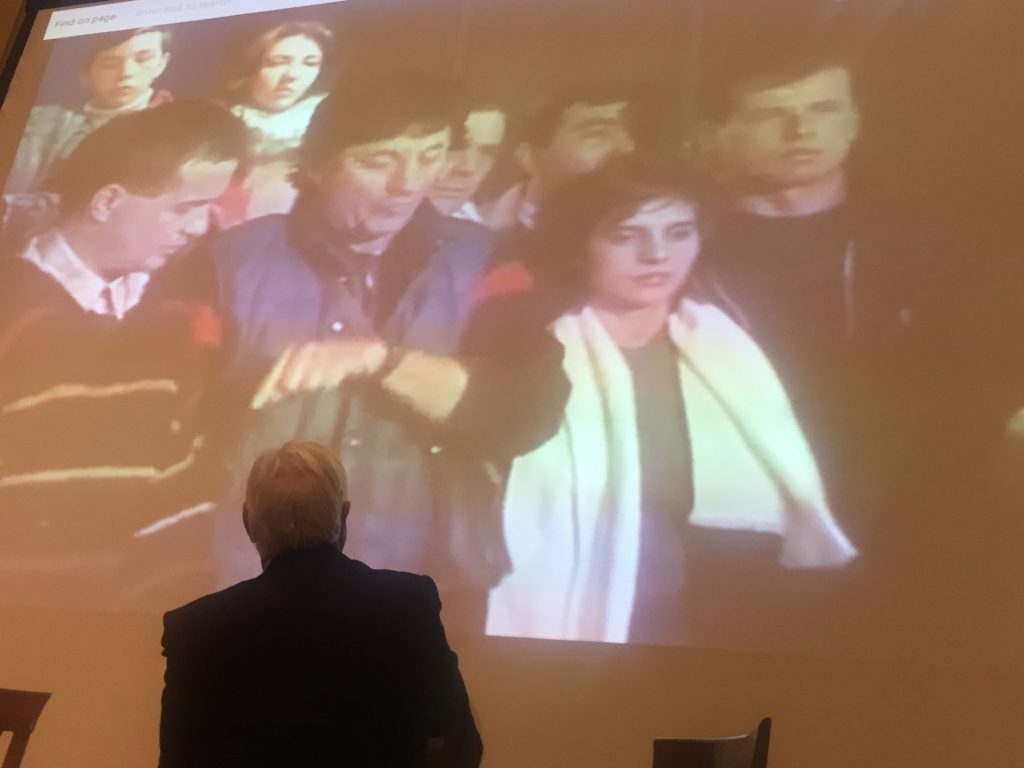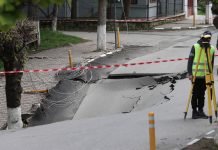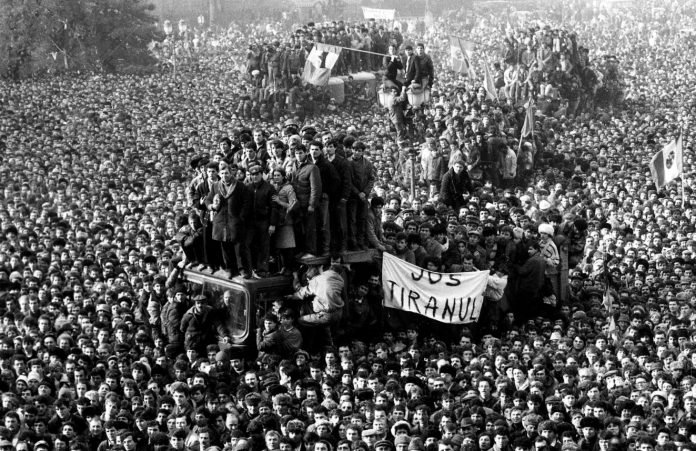Communist leader Nicolae Ceausescu had only hours to live when veteran BBC journalist John Simpson gained access to his flat in the Central Committee building in Bucharest.
Few had laid eyes on it, but rumor had it that it was a luxurious pad, even by capitalistic Western standards. Yet when Simpson stepped into the quarters, he saw “a tatty, sad old thing with thin curtains” that didn’t even cover the window frames and “two narrow little beds,” where the dictator’s pajamas lay.
Outside, fighting raged around the city and across Romania as Securitate and other troops loyal to Ceausescu opened fire on unarmed protesters. Tanks rolled in the streets. Amid the unrest and bloodshed, this was a private, intimate moment.

CEAUSESCU’S PEN
“His housekeeper was in tears,” Simpson said recalling the moment thirty years ago when upon seeing the shabby little apartment, he had a fleeting moment of sympathy for Ceausescu. The housekeeper was so moved by Simpson’s interest in her master’s quarters that she insisted on giving him a memento. Simpson left with a fountain pen.
Later, having prepared his package, he headed to Romania’s public television station, TVR, which foreign broadcasters used during the uprising to feed their material. As he arrived, people in the studio were erupting with joy: news had come in that Ceausescu and his hated wife Elena had been executed by firing squad.
NEWS OF CEAUSESCU’S DEATH
There were just minutes to go before Simpson needed to send his video package and text to London, and there was only one thing to do. He tore up his original script and began a rapid rewrite with the news that the Ceausescus had been shot dead.
In ten minutes, he produced a fresh 450 to 500 word piece, writing so fast that his wrist ached.
It was only when he stopped writing, did he realize that he had „written Ceausescu’s obituary with his own pen.”
“It was one of the ironies of the revolution,” Simpson, who is BBC World Affairs Editor, told students Wednesday at an event called #30yearsoffreedom organized by the British embassy and the British Council dedicated to remembering the sacrifices of the revolution and the freedoms it brought.
Actor Ion Caramitru who rode a tank during the uprising and addressed Romanians on television after the overthrow of Ceausescu and Dennis Deletant, a British professor of Romanian literature and language and historian of the history of Romania were among the speakers at the one-day event at the Carol I University library.
THE SPRING OF 89
Simpson, who’s now worked 53 years for the BBC, had previously reported from Romania. His last visit was months before when he wanted to do a piece on the repression that Romanians were living under. The repression was clear, and the reporting hard. Ceausescu’s grip on power seemed so iron-cast, that like many, Simpson didn’t believe the regime would collapse.
But as he watched video streaming in of Ceausescu’s speech in the BBC headquarters on Dec. 21, Simpson knew revolution was in the air. He heard the crowd in Bucharest jeer and boo their leader and he saw the Communist strongman startle and his expression change.
THE REVOLUTION’S STARTING
“I’ve got to get on a plane; it’s starting,” he said. Hours later he was in Belgrade with his crew where they hired a Mercedes and drove through the night to Bucharest. Though free of traffic, the road was far from smooth.
Their car veered off the road and got stuck in a ditch hours from Bucharest. The road was deserted and there seemed little hope of dragging it out, until Simpson spotted a large truck coming toward them.
“I stood in front of it and it stopped just before it ran into me.” He could have been run over but action “was essential, it was the last revolution” in Eastern Europe. They plied the driver with a bottle of whisky and chocolate, and he obliged using chains to pull the car out of the ditch.
GUNFIRE IN BUCHAREST
Simpson and his crew arrived in Bucharest just after sunrise as the tanks were coming in. They drove in alongside them, getting shots of the vehicles.
He remembers seeing the Army opening fire “not on crowds but on what were believed to be Securitate snipers.”
Later, he saw Army forces destroying the library and triggered by the impending destruction of precious books, he got out of the car to protest. He was promptly hauled aside accused of being a supporter of the Securitate, and a gun was pulled on him.
“They put a gun to my head, I went on my knees,” he told the audience of students from high schools around Romania. “If I hadn’t have groveled, I would have been one of them,” he said referring to three journalists who were killed during the violence, including a friend, French cameraman Jean-Louis Calderon.
ELENA, THE ‘TOUGH ONE’
He recalls the flight of the Ceausescus after they left Bucharest in a wobbling helicopter and how, having been abandoned by all their aides, one by one, the pair found themselves alone and fending for themselves.
“Elena was tougher than her husband and hijacked a car,” he said. Soon, they faced a kangaroo court and were shot. „They didn’t think they would be executed,” he said. “But that is what happens when dictators get captured.”
TERRIFIED SOLDIERS
He says the soldiers were overcome by fear, not glee as some as some have speculated, due to the terror in the final years of the communist regime. “Fear meant they emptied their magazines.”
“The firing squad was so nervous, there was no control or discipline and by the time the camera was rolling, their bodies were lying lifeless on the ground,” Simpson said.
It was said there was so much lead in Ceausescu’s body, it took ten men to lift his body. That’s what was said, but Simpson thinks it may not have been actually true.
PEOPLE’S REVOLT
In the end, the 1989 events as they are known in Romania, will be remembered for the people who rose up against the Communist leader.
“’It gives me great pleasure to look at the pictures from the 21st of December
1989 when this appalling man, Ceausescu, tried to address the crowds, but was
silenced by the people,” Simpson said.
PROGRESS
“We do need to remember the past, but not just the glorified version, the nuanced version as well. For all its failures and faults, I think Romania should be immensely proud of its progress.”
.




















A great read, as always, Alison.
Thanks Cath Adams, always sharp, always on the ball!
[…] Liderul comunist Nicolae Ceaușescu mai avea câteva ore de viață atunci când John Simpson, jurnalist veteran al BBC, a reușit să obțină accesul în apartamentul dictatorului din clădirea Comitetului Central din București, scrie Alison Mutler într-un articol publicat în ediția engleză a universul.net. […]